
Personal Details of William Kyle (Brigadier General) Hardy
| Born: | |
| Died: | |
| Buried: | 11/12/1936 |
Listed below are all the details we have been able to find so far on William Kyle (Brigadier General) Hardy.
As far as we are aware, all the information is correct. However, sometimes transcriptions can lead to errors being made. If you find any errors or omissions, please let us know and we will endeavour to get them corrected as soon as possible.
If you have any further information on William Kyle (Brigadier General) Hardy, we would be delighted to hear from you.
Birth
There is no information in our database regarding the birth of William Kyle (Brigadier General) Hardy.
Can you help us? If so, please contact our History Research Group.
Death
There is no information in our database regarding the death of William Kyle (Brigadier General) Hardy.
Can you help us? If so, please contact our History Research Group.
Burial Register
| Name at death | William Kyle Hardy | ||||||
| Age at Death | 71 | ||||||
| Burial Date | 11 December 1936 | ||||||
| Abode |
8 Buckingham Road
Newbury |
||||||
| Official at Burial | W L Cooper (Rector) | ||||||
| Comments | Mrs P page 168 P(B)20 | ||||||
| Burial Register Index |
|
||||||
| Sources | Burial Register |
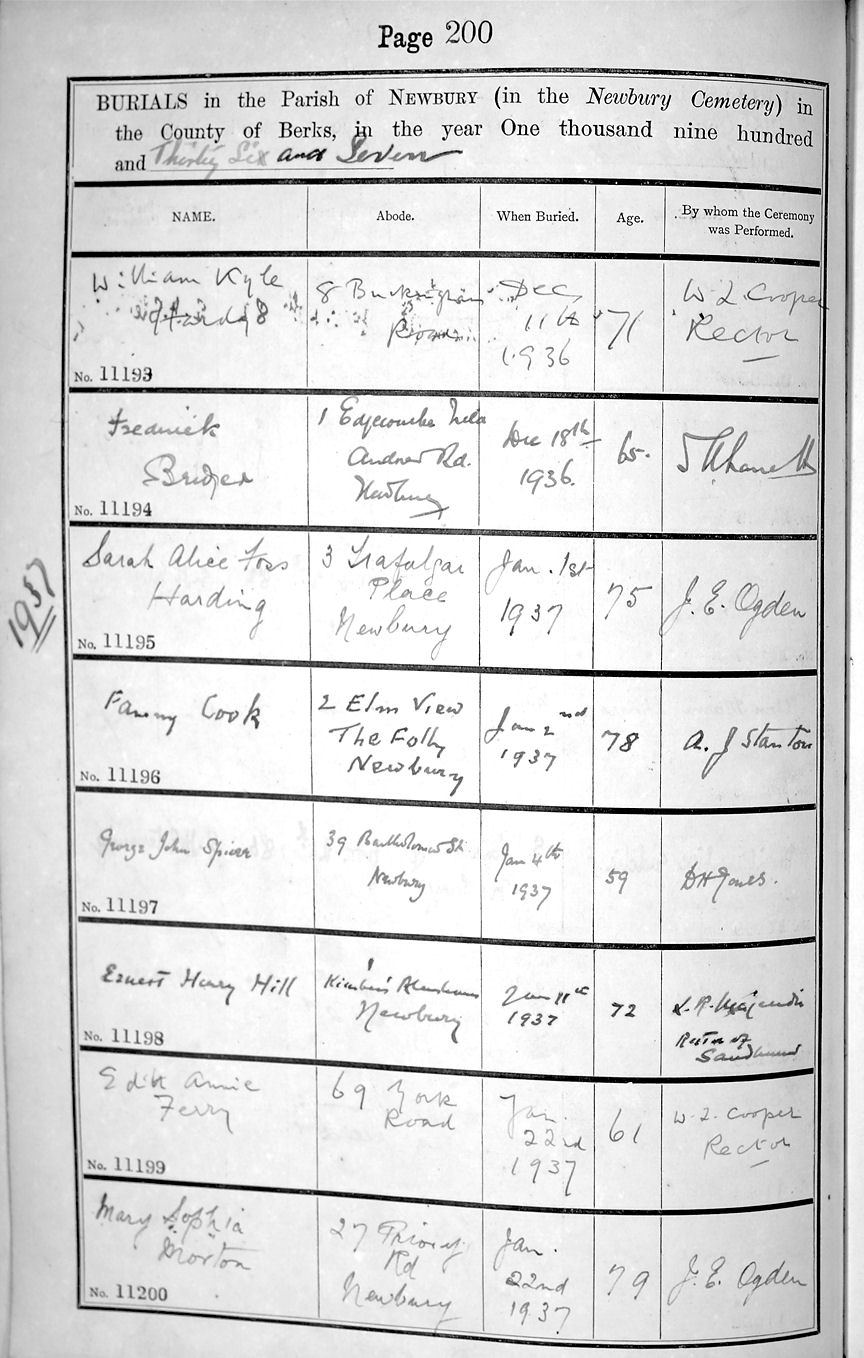
Burial Register entry for William Kyle (Brigadier General) Hardy
©Newbury Town Council
Reproduced with kind permission
Memorial Details
| Headstone: In / Loving Memory of /Brigadier-General / William Kyle Hardy / Royal Artillery / who died Dec. 9th 1936 / aged 71 years. / Also Jessie Hardy / his beloved wife / Feb. 28th. 1951 / aged 83 / R.I.P. // | |
| Name on Memorial | Brig-Gen William Kyle HARDY |
| Date of death | 09/12/1936 |
| Age | 71 |
| Gender | Male |
| Memorial Type | Headstone; 3 Kerbstones |
| Construction Material | Granite Lead letters |
| Condition of memorial | Very good; slight tilting of grave. Overgrown |
| Pattison Location Code | P(B)20 |
| Recorder's Notes | William Kyle Hardy was born in Co Cork but was living in England as a boy & went to school in Winchester (1881 census). He joined the Army and was a Lieutenant in the Royal Artillery in India in1889. He married Jessie Harland, daughter of the Vicar of Harefield, Middlesex in 1899. She had been at school in Oxford but lived at home afterwards. Their two daughters and a son were all born in West Bengal, India where William was serving. By the 1911 Census William was a Major with the family living in Wonston, nr Sutton Scotney, Hants. He was a Lt Col. by 1915 and serving in the Indian Medical Service in 1917. They were still in Wonston in 1918. The first record of the family living at 8, Buckingham Rd, Newbury was in 1929 & they lived here until William was killed in his sleep by carbon monoxide poisoning in 1936 and Jessie's death in 1951. Their two unmarried younger children also lived at 8, Buckingham Rd, Hubert, an engineer, until his marriage in 1945 and Janet until about 1959. The NWN Obit in the NRC Bur Rcds gives an account of William's death. Sources: NRC Bur Rcds; Ancestry records. |
| Others named on memorial | |
| Jessie HARDY |
Newspaper Cuttings
The articles below have been transcribed from newspapers and magezines.
William Kyle Hardy
| Source: | Newbury Weekly News | ||||||||||||||||||||||||||||
| Article date: | 10/12/1936 | ||||||||||||||||||||||||||||
| Copyright: | Newbury Weekly News | ||||||||||||||||||||||||||||
| Transciption: | WILLIAM KYLE HARDY INQUEST ON GENERAL HARDY “ACCIDENTAL DEATH” At the inquest on Brig. General William Kyle Hardy, held at his residence, 8 Buckingham-road, Newbury, on Thursday morning last, the theory was put forward that when the General went to bed following a hot bath he fell quickly asleep forgetting about the gas fire being alight, that somehow the flames were extinguished, and he was overcome by inhaling the carbon-monoxide gas. The Borough Coroner, Mr. A.V. Pinniger, said he had not the least doubt that the General met his death accidentally, and a verdict in accordance with the medical evidence was recorded. PREFERRED TO SLEEP IN CAMP BED Mr. Hubert Kyle Hardy, son of the deceased gave evidence of identification. He said that his father was a retired Brigadier-General of the Royal Artillery and was 71 years of age. Except when attended by Dr. Wood three weeks ago when he slightly injured his leg when struck by a motor-car, deceased had not had a doctor for years and he enjoyed good health. He appeared to be in his usual health and appetite on the Tuesday evening, and witness saw him when he retired to his bedroom about 9.30pm. Previous to supper he had had a hot bath, and he remarked that the water was unusually hot. He had spent many years in India camping out, and since he had preferred to sleep in a camp bed, which he did on the Tuesday night. Sometimes he had rather restless nights, and he used to get up very early in the morning and make himself a cup of tea. They did not hear him about during the Tuesday night. It was the General's habit to sleep with the window open. About a month ago, continued witness, General Hardy had a small gas fire fitted in his bedroom and he used to light it when he wanted it. He was very pleased with it, and as far as witness knew had experienced no difficulty with it. He always lit it and turned it out himself. Mr. hardy said that he was in his bedroom dressing on the Wednesday morning when he heard a commotion downstairs, and on going down he was told what had happened and he at once telephoned for a doctor. FOUND BY HIS WIFE AND DAUGHTER Miss Janet Irene Hardy said that just before going to bed on the Tuesday evening her father handed her a letter to read and asked her to give it back to him in the morning. He was very interested in ancient kilns, and the letter dealt with this subject. He was looking forward to investigating this matter, for which he had made arrangements. Next morning, about 8.30, her mother went into her father's bedroom and immediately called witness. She went and found her father lying on the floor. He was in his night attire and unconscious, and he never spoke at all. Noticing a strong smell of gas in the room, she saw that the gas fire was turned on but not alight. She thought the gas tap was nearly full on. She turned it off and put her coat round her father also a hot water bottle, and sent for a doctor. The window in the bedroom was open as usual. DOCTOR'S EVIDENCE Dr. C.E. Riddiough Wood said he was called to see General Hardy at about 9.5am on December 9th. He found him lying on the floor bedside his bed in a room in which there was a strong smell of coal gas. He was evidently dying, as he could feel no pulse and the respirations were very laboured. He administered oxygen and heart stimulants, but he died in a few minutes. Witness made a post-mortem on the Coroner's order and found no evidence of apoplexy nor of heart failure, nor was there any gross disease in any of the organs. The blood was remarkable for being pink in colour, which was typical of coal gas poisoning. Dr Wood said he presumed what most likely happened was that the General went to bed after his hot bath and quickly fell asleep, forgetting that the gas fire was on, and somehow the flames went out during the night. Maybe he noticed a strong smell of gas and got out of bed to try to turn the tap off, and collapsed. The Coroner: Being on the floor it would be still more dangerous?-Yes. Even though the window was open, in eleven hours he would have inhaled enough carbon-monoxide to kill him, concluded the doctor. THE VERDICT The Coroner said he had not the slightest doubt that General Hardy met his death quite accidentally. There was not the least evidence or presumption that it was a case of suicide, so he would record a verdict as follows: “Died from coal gas poisoning when the gas fire was accidentally unlighted and not turned off.” The Coroner added that he would like to thank Dr Wood for coming to the house so extraordinarily quickly.
Newbury Weekly News 10 December 1936
Mrs P. p. 168 P (B) 20 died 9 December 1936 aged 71
The National Archives |
||||||||||||||||||||||||||||
| This obituary entry is awaiting verification. |
William Kyle Hardy
| Source: | |
| Article date: | |
| Copyright: | |
| Transciption: | WILLIAM KYLE HARDY
“The death of Brigadier-General W. Kyle Hardy is felt deeply by all members of the Newbury District Field Club. His keen enthusiasm, his varied and extensive knowledge, his practical work in excavation, his modesty about his achievements and the charm of his lectures to the Club make an enduring loss and an unforgettable memory. The son of Major-Gen. Frederick hardy, C.B., who served throughout the Indian Mutiny, Brig.-Gen. W.K. hardy passed second into the R. Mil. Acad., Woolwich, straight from Winchester College and went to India on obtaining his commission in the Royal Artillery in 1885. Though a keen soldier and a great sportsman he combined with both an interest in archaeology. When out shooting on one occasion, he found that his shikari had set out his meal on the skull of a pre-historic elephant which had been lately exposed in the cliff of a river valley. He determined to attempt to take one of the great tusks back with him and, with infinite difficulty, the small party managed to transport it to civilisation and present it to the museum at Secunderabad. He was an authority on Indian Birds and Fishes, and had a great knowledge of the languages of the Tribes on the North-West frontier; here he collected a number of silver Greco-Bactrian coins of about B.C. 300, used by Alexander the Great in Northern India. As a subaltern he shot a record tiger, a man-eater, a fact remembered, years after, by his sole shikari , when another huge beast almost rivalled it, and the records of the Native State were consulted to prove the dimensions. He took part in the Black Mountain Expedition of 1891 and commanded one of the Mountain Batteries but, even then, he collected a root of the black poppy which survived the journey home and thrived and flowered at Cork. In the Great War he served in Mesopotamia, and was mention[ed] in Dispatches. He was in action at Kut in 1914, at Sheil Said, Wadi Falayah and Saurayah. Promoted Brigadier-General in 1916, he served at the capture of Saurayah and throughout the hard-fought advance on Bagdad(sic). He commanded the 7th Division R.A. in 1917 until invalided. On his return to England, a year later, he commanded the Forts at Weymouth and Portland. He retired in 1920. One of his latest archaeological achievements was the discovery and excavation of a Romano-British kiln (circa A.D. 400) at Woodrow’s Farm, in Compton parish, close to the Aldworth boundary. This unique find was taken to London by the authorities and re-erected in the Science Museum at South Kensington. Owing to its great weight, 5 tons, it is placed in the basement, in the children’s section. D.S. “
|
| This obituary entry is awaiting verification. |
William Kyle Hardy
| Source: | Newbury Weekly News |
| Article date: | 10/12/1936 |
| Copyright: | Newbury Weekly News |
| Transciption: | WILLIAM KYLE HARDY TRAGIC DEATH OF BRIG.-GEN. W.K.HARDY ACCIDENT WITH GAS FIRE DISTINGUISHED MILITARY CAREER The death occurred yesterday (Wednesday) morning in tragic circumstances of Brigadier-General W.K. Hardy at his home in Buckingham-road, Newbury. His daughter found him lying unconscious in his bedroom and he died a few minutes after the arrival of Dr. C. E. R. Woods. A gas fire was turned on and the windows and a ventilator were open, indicating that death was due to an accident. It was Brig. General Harding's custom on cold nights to turn on the gas fire, which he installed in his bedroom about a month ago, and it appears that yesterday morning it was turned on but was not lit. The facts have been reported to the Borough Coroner, Mr. S.V. Pinniger, who is to hold an inquest. Brigadier-General William Kyle Hardy, late Royal Artillery, was descended from distinguished families. His father Major-General Frederick Hardy, C.B., Hon. Colonel of the York and Lancaster Regt., served through the Indian Mutiny and was present at the relief of Lucknow. He traced his descent from a Huguenot family, which fled to Ireland to escape persecution and settled in Cork. His mother was descended from the Scottish Kyle family, which settled in Northern Ireland during Stuart times. As a boy he lived in Dublin with his grandfather, Archdeacon Kyle, while his parents were abroad. His great-grandfather was Bishop Kyle of Cork and a great friend of Sir Walter Scott and Raeburn. All his five brothers and two brothers-in-law served in either the Army or Navy, and one, Admiral C.T. Hardy, A.D.C. to H.M. the late King George, died recently. He was educated at Winchester and Woolwich Academy, and on receiving his commission he went to serve in India for 32 years, except for a brief spell at Malta. He was a keen sportsman, a strong swimmer, holding the R.H.S. medal for saving the life of a soldier in India: a first-class angler and expert shot, he accounted for a record tiger. He had a narrow escape on one occasion from a bear, when completely disarmed, and was one of the few men who have been hugged by a bear and lived to tell the story. Since his retirement, he developed an interest in archaeology, and was on the committees of the Berkshire Archaeological Society and of the Newbury Field Club. He was a member of the Southern Counties Archaeological Society, and was constantly engaged in field work on the downs. Last year he discovered and assisted in excavating a pottery kiln at Aldworth nearly 2,000 years old This was a unique find, and considered of such importance that it was taken intact to London by the authorities of the Science Museum at South Kensington and re-erected there. He went to the official opening and Press view of the kiln only last week, In India he was regarded as an authority on Indian birds and fishes. For many years he was a sidesman at the Newbury Parish Church, and was on the Parochial Council and the Finance Committee, and attended all the meetings with great regularity. Military Service. He spent most of his life on the North-West frontier, and was an expert on the languages of that troubled area. For many years he commanded one of the famous mountain batteries. He served in the Hazara expedition of 1897, and was awarded a medal on that occasion. During the War, he served in Mesopotamia on the march to Kut, in the action at Kut at the end of 1914, and in actions at Sheil Said, Wadi Falalyah and Saunayah. He was promoted Temp. Brig.-General in 1916, was in action opposite Kut, November and December 1916, at the capture of Saunayah and the advance on Bagdad. He was also in action at Shava Khan in April, 1917, and in the advance on Samara and the actions at Khan Mustedin and Beled. He commanded the Royal Artillery 7th Division as Brig. General in 1917, and commanded no. 3 section Tigris River Tigris defences in May 1917. In 1917 he was invalided back to India, after which he returned to England and commanded the forts at Weymouth and Portland until his retirement on reaching the age limit in 1920. He was offered an appointment in Egypt, but had to refuse it on account of his health. He was mentioned in despatches during the Mesopotamian campaign. Brig.-General Hardy had lived in Newbury for the past eight years. Only on Tuesday he visited the Newbury Museum and was in the best of spirits. He leaves a widow, one son and two daughters, for whom great sympathy is felt. The funeral is to be private, and there will be no flowers by request. Newbury Weekly News 10 December 1936 |
| This obituary entry is awaiting verification. |
Pictures and photographs
The pictures below are all linked with William Kyle (Brigadier General) Hardy.
Click an image to show an enlarged version of it.
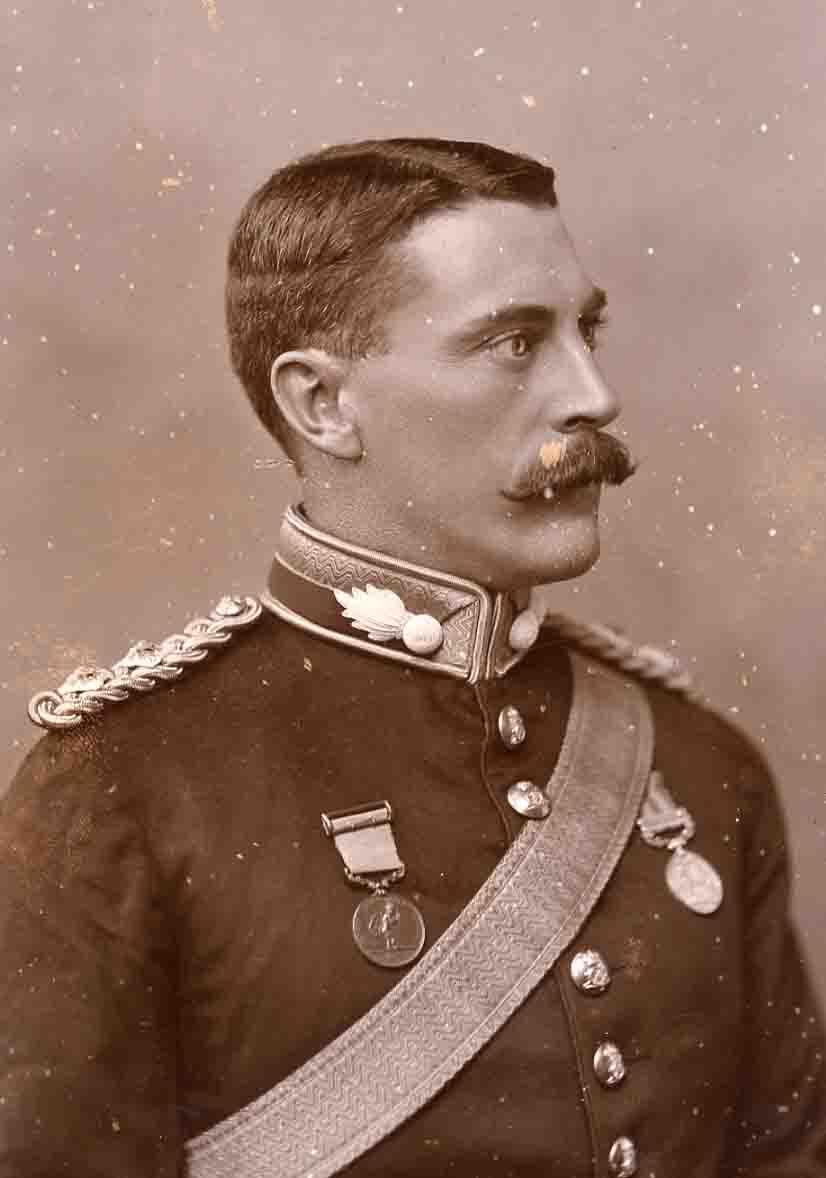
William Kyle Hardy
© Royal Artillery Museum
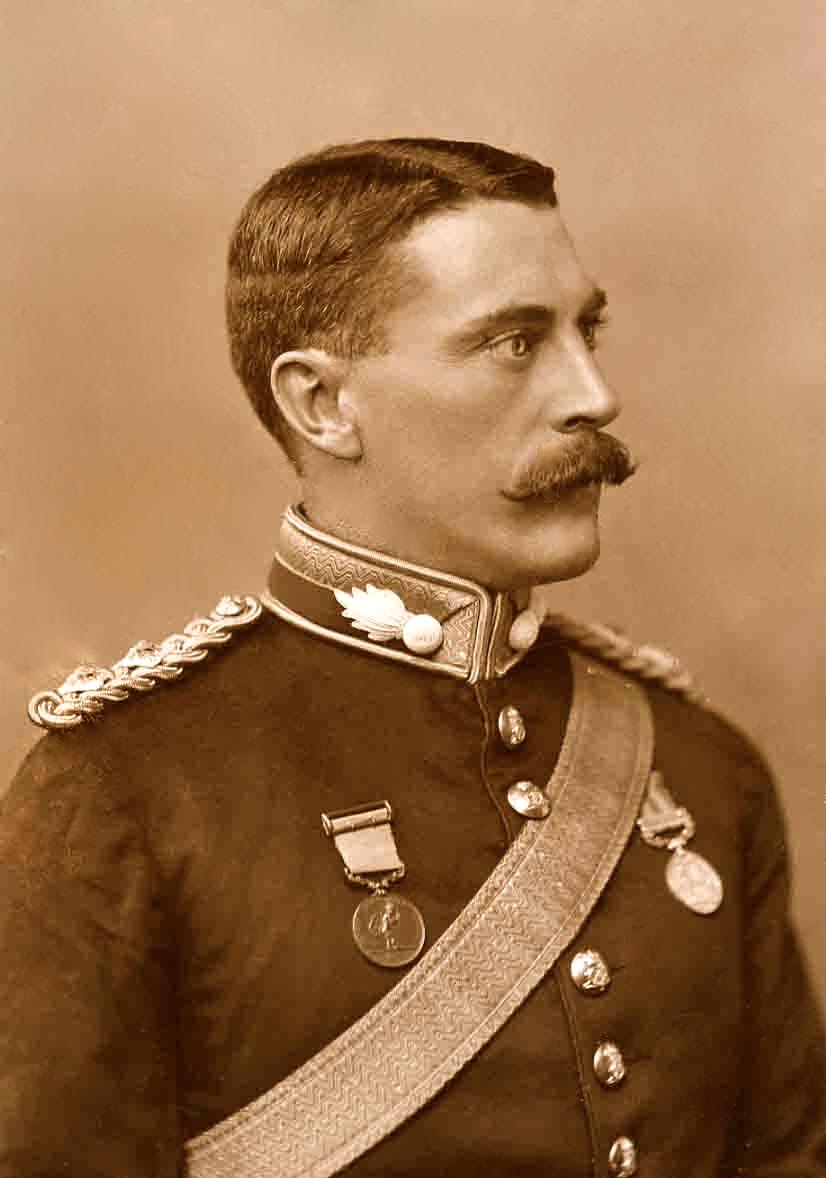
William Kyle Hardy
© Royal Artillery Museum
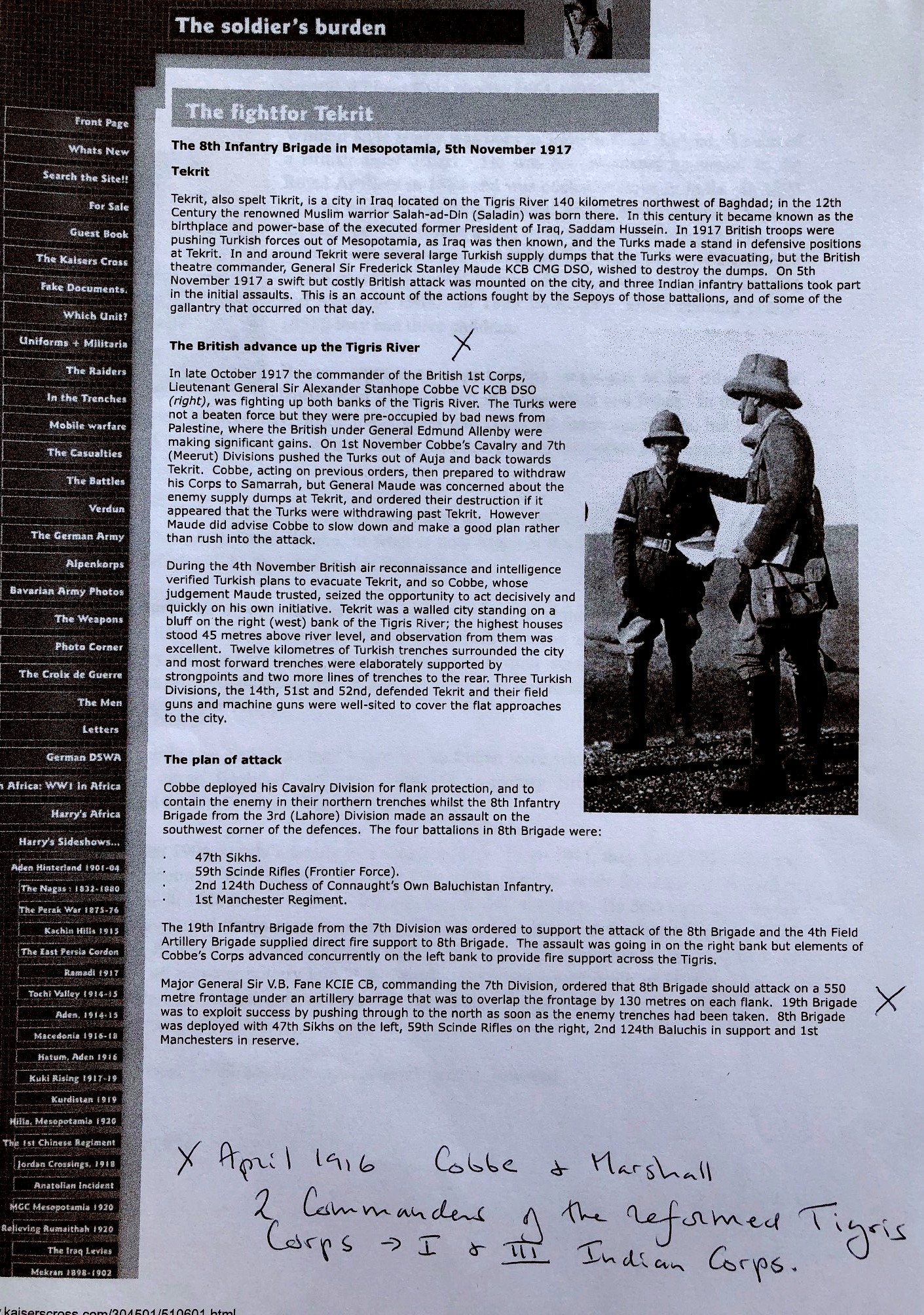
The fight for Tekrit 1917
©
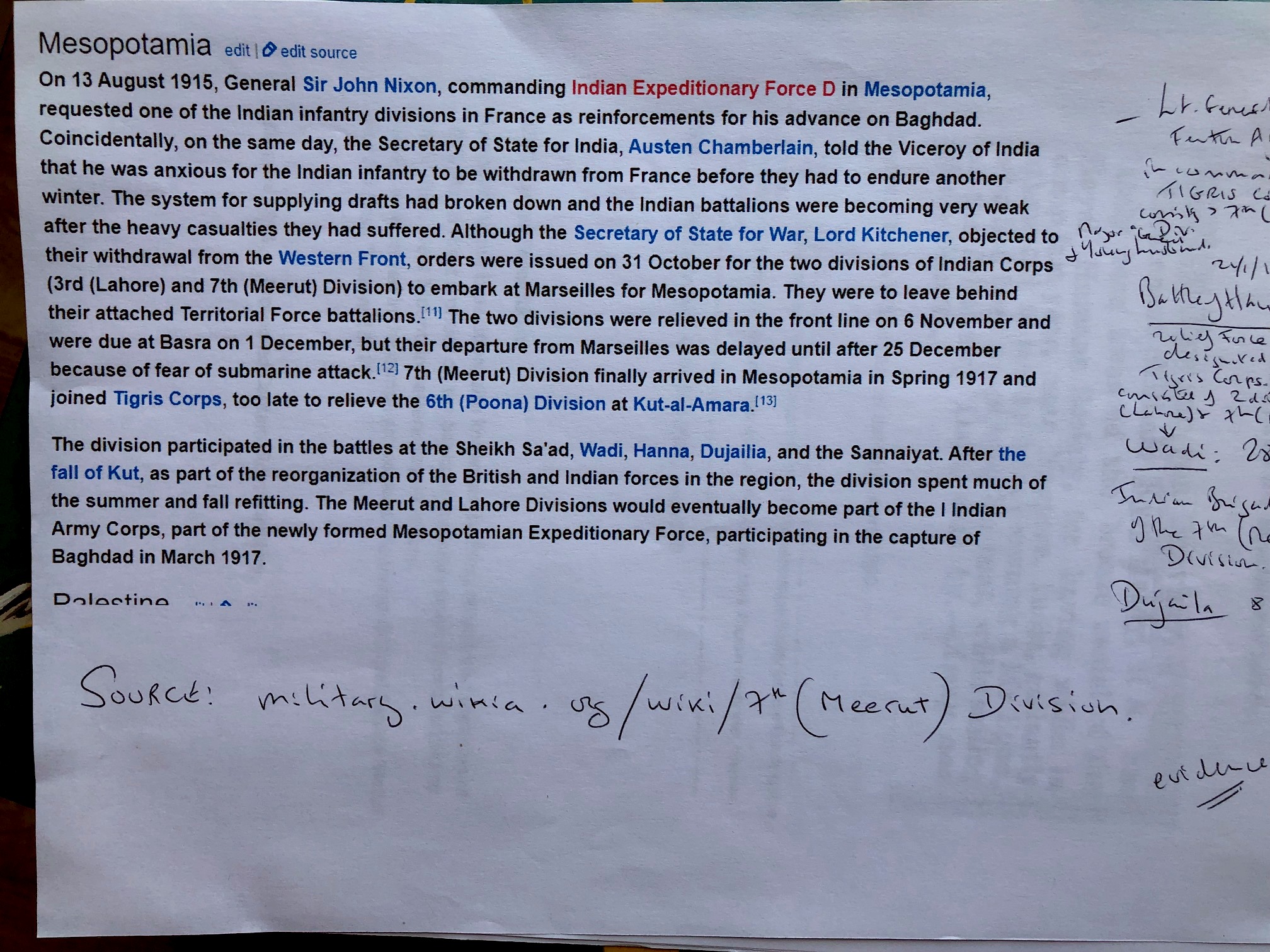
Mesopotamia
©
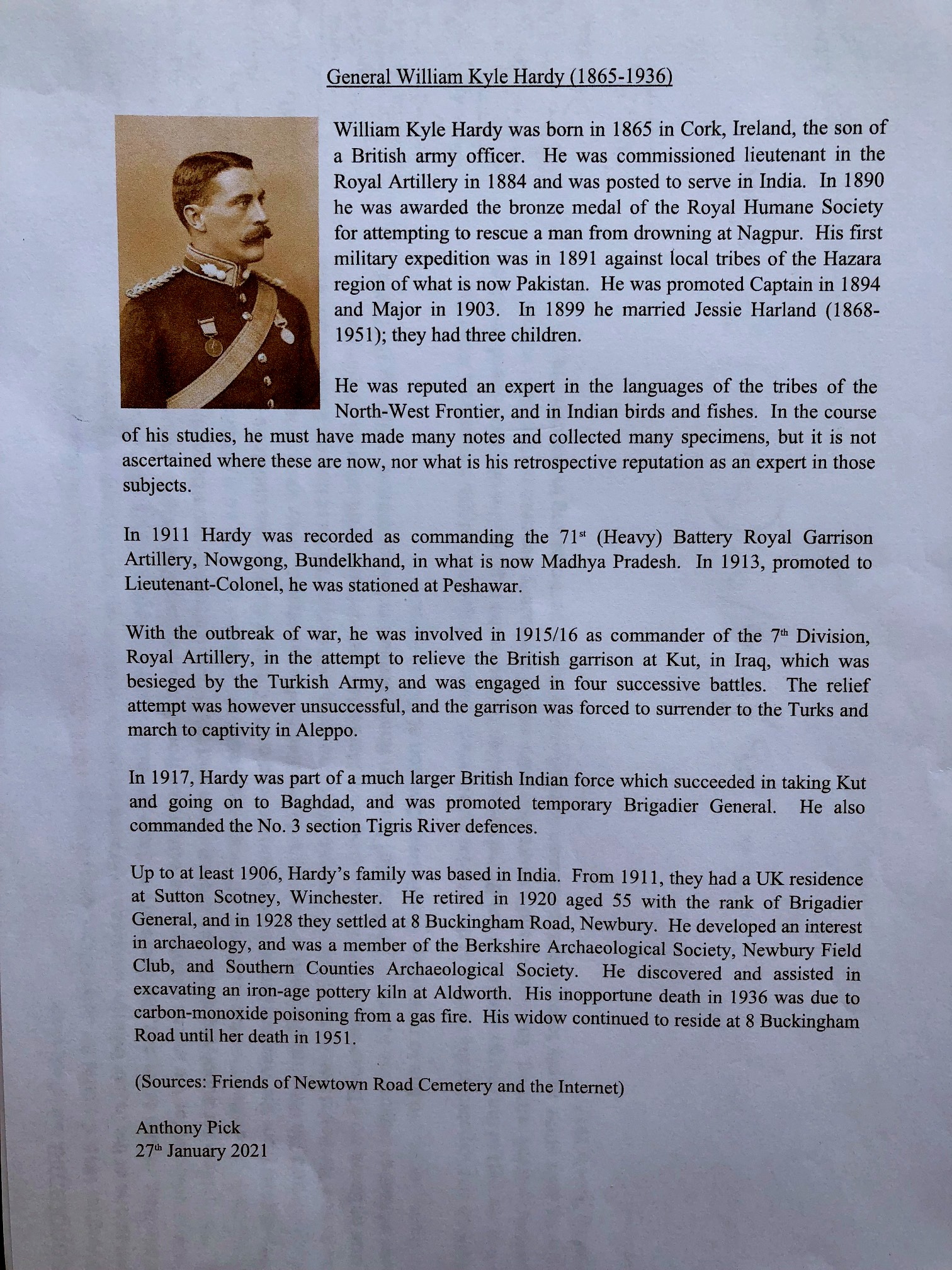
General William Kyle Hardy 1865 - 1936
© Anthony Pick
Biographical Information
The articles below contain information about William Kyle (Brigadier General) Hardy.
William Kyle Hardy Brigadier General
William Kyle Hardy
Civil Decoration for Gallantry from The Royal Humane Society:-
Lieutenant William Kyle Hardy R.A., has lately been awarded the bronze medal of the Royal Humane Society, for having while in the camp last year, near Nagpore, India, gallantly attempted to rescue from drowning a Mr Egan who bad been upset from his boat while sailing on the Telinkerry Tank, near by.
—Army and Navy Gazette
Source: The Cork Constitution dated 25 April 1890
A further report -
Captain Hardy was awarded the Bronze Medal of the Royal Humane Society for his efforts to rescue a police constable from drowning at Nagpore, lndia, on the 10th February, 1889. Captain Hardy was, however, unsuccessful.
Source: Hart's Annual Army List 1902, page 990
1891 Hazara Expedition:
Served in Hazara Expedition, also known as the Black Mountain Expedition of 1891, North West Frontier on the banks of the Indus River: from 1/3/1891 to 29/5/1891. No.1 Mountain Battery Royal Artillery. Soldiers who served in the campaign received The Indian General Service Medal with the clasp "Hazara 1891".
1 January 1894 Promoted Captain, Royal Artillery.
From 3 October 1901 to 11 December 1903: Staff Service: D.A.A.G. (Deputy Assistant Adjutant General) for Royal Artillery, India.
12 December 1903 Major, R.A.
1911 Census Living at Highfield, Wonston, Hants. Occupation Major Royal Garrison Artillery; wife Jessie, daughters Rosalind Jessie and Janet Irene, and son Hubert Kyle. Also a domestic governess and a domestic servant.
He is recorded in the 1911 Enumeration, Return of all Commissioned Officers, Warrant Officers, NCOs , Rank & File. He is a Major, aged 45, married, 71st (Heavy) Battery, R.G.A. Absent in England — see above. On the front page he is named as the Commanding Officer of 71st (Heavy) Battery Royal Garrison Artillery, location Nowgong, Bundelkhand, and he is reporting to Lieut. Colonel Percy de Saumarez Burney. Nowgong served as British HQ of the Bundelkhand Agency.
29 January 1913 Lieutenant Colonel, R.A. From the Monthly Army List dated Oct. 1913 he is recorded "Lt. Col. Heavy Art. Peshawar".
World War 1
Working on the location references etc. in Mesopotamia from the two obituaries on the website:
a) Kut 1914 This probably refers to Battle of Kut al Amara 28.9.1915.
b) Sheil Said Action of Sheikh Sa'ad — 6-8 January 1916. First unsuccessful attempt to relieve Kut.
c) Wadi Action of Wadi River — 13/14 January 1916. Second unsuccessful attempt to relieve Kut.
d) Falayah and Saurayah
I think this refers to attack and capture of Urn-Al-Hannah and Falahiyah, followed by attacks on Sannaiyat, and then fall of Kut - between 11.3.1916 to 29.4.1916. 7th Division is mentioned in report from Lt.Gen. Sir P.H.N. Lake, K.C.B., K.C.M.G., commanding Indian Expedition Force 'D'. (Refer London Gazette dated 12.10.1916 Supplement 29782, page 9851, 3rd phase). 7th Division charged Ottoman lines at Hannah but failed against their positions and were forced to abandon and returned to the base at Ali Gharbi.
17-24 February 1917 Capture of Sannaiyat and then Kut. 11 March 1917 Occupation of Baghdad. Then advance to Samarra via Balad Ruz. Samarra occupied 24 April 1917. Could not find any reference to Shava Khan or Khan Mustedin. There is reference that he commanded No.3 Tigris in May 1917. There was an Anglo-Indian Tigris Corps during the Mesopotamian Campaign. Could find no record when he returned to England.
14.8.1917 London Gazette 3rd Supplement, page 8328. He receives special mention by Lieut.-General Sir Stanley Maude, K.C.B., Commander-in-Chief, Mesopotamian Expeditionary Force. His name appears under the heading of Staff and Headquarters.
British Army List 1918 October Part 1, page 276 records: 14.3.1916 to 7.4.1917 Temporary Brigadier General : Colonel R. Art. India 14.3.1916 to 14.1.1917 and Brigadier General R .Art. 15.1.1917 to 7.4.1917.
From National Archives: Britain, Campaign, Gallantry & Long Service Medals & Awards:-
1914-15 Star
Service Record Rank: Colonel Corps: Heavy Artillery Brigade Royal Garrison Artillery.
Second Service Record Rank: Lieut. Colonel Corps: as above
Theatre of War Mesopotamia 25.12.15 EF/9/974 16.1.23 qualifying date EF/6/10003
Residences
1911 to 1927 Residence in England : Highfield, Wonston, Sutton Scotney, Hants. His name appears on Absent Voters List Winchester Division for 1920 Spring & Autumn - Brig.Gen. Sgt. (Col.) R.G.A, . and 1921 Autumn - Brig. Gen. R.A.
1929 Living at 8 Buckingham Road, Newbury, with his wife Jessie, daughter Janet Irene and son Hubert Kyle. On Electoral Register 1929/1930/1931. could not find 1928.
Author:
©
*The FNRC believe that the certificates published on this page have been added in compliance with the rules laid down by the General Register Office (GRO). Click here for more information.
If you believe that we may have inadvertently breached the privacy of a living person by publishing any document, please contact us so we can immediately remove the certificate and investigate further.
Thank you.
FNRC.
© 2010-2023. Friends of Newtown Road Cemetery, unless otherwise stated.
Web site designed by Paul Thompson
The Friends of Newtown Road Cemetery is a not-for-profit organisation that works in association with Newbury Town Council to look after and maintain Newtown Road Cemetery for the benefit of the people of Newbury.